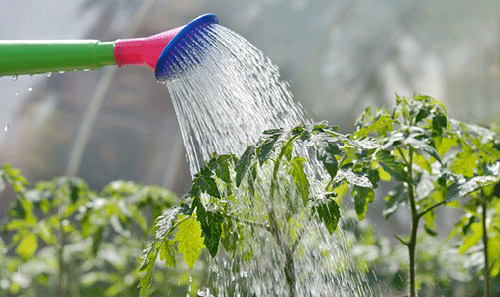
A versatile material that might be quite beneficial in your garden is hydrogen peroxide. It can be used for a variety of things because it has an extra oxygen atom. Allow me to present to you ten incredible garden applications for hydrogen peroxide!
Hydrogen peroxide possesses potent antibacterial properties. It can be used to sanitize greenhouses, pots, and gardening implements. Just take caution, as hydrogen peroxide does not affect all bacteria. Additionally, take care to keep plant tissues and your skin separate.
Plants can become suffocated by root rot. Water them with a solution of 3% hydrogen peroxide and one quart of water to stop this. Your plants can use the additional oxygen that the hydrogen peroxide adds to the soil to survive. Keep in mind to maintain a damp top layer of soil until you start watering regularly again.
There are various advantages to using hydrogen peroxide while planting seeds. It can speed up the germination process and produce more sprouts per seed. Soak your seeds for half an hour in a solution containing 3% hydrogen peroxide before planting. Plant them after that as normal.
Mold and mildew can be effectively eradicated with hydrogen peroxide. Mix one liter of water with ten tablespoons of 3%–6% hydrogen peroxide to make a spray mixture. Use this mixture on your plants once a day until the fungus goes away.
Hydrogen peroxide’s additional oxygen molecule facilitates plants’ better uptake of nutrients from the soil. One gallon of water and a teaspoon of 3% hydrogen peroxide can be used to make a fertilizer solution. Water your plants periodically with this solution.
Another use for hydrogen peroxide is as a natural insecticide. In a spray bottle, combine equal parts water and 3% hydrogen peroxide. Use this mixture on fruits and vegetables that can contain bacteria as well as bugs that are bothering your plants.
It is essential to clean the seeds before sowing in order to avoid young seedlings being harmed by infections carried by seeds. After soaking the seeds for five minutes at 140°F in 3% hydrogen peroxide, rinse them with normal, room-temperature water.
Plant rot can be caused by bacterial infections, particularly on fruit, flower buds, bulbs, and tubers. Spraying your plants with a hydrogen peroxide solution will protect them. If you want to maximize your protection against bacteria exposure during storage, you can spray this mixture after pruning or apply it straight to newly cut tree branches.
Apply a 10% hydrogen peroxide solution to your sidewalks or concrete pavements and let it work for a while to get rid of weeds. Applying the hydrogen peroxide in the early morning or late evening, when sunshine won’t immediately break it down, will yield the best effects.
Once your produce is harvested, mist it with a solution made of ½ cup water and 1 tablespoon hydrogen peroxide. By stopping the oxidation process that leads to wilting, this will aid in their preservation. Produce stored in the refrigerator for extended periods of time can retain its freshness thanks to this hydrogen peroxide solution.
A great addition to your gardening routine is hydrogen peroxide. It’s a user-friendly, safe solution that can improve the health of your garden and shield your plants from dangerous microbes. Enjoy the advantages of hydrogen peroxide in your garden by giving it a try!